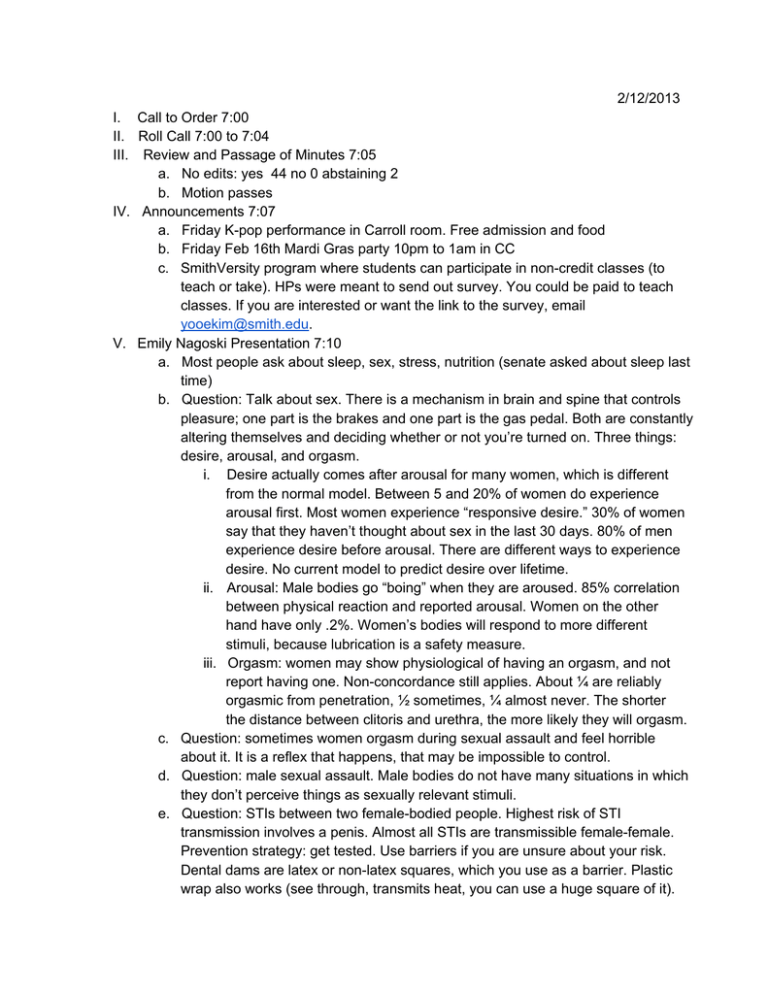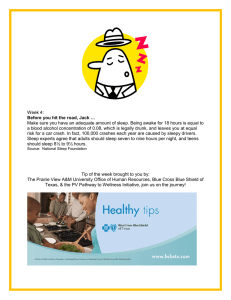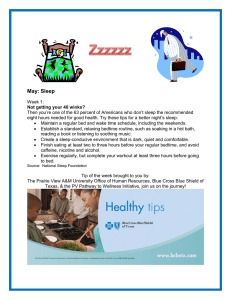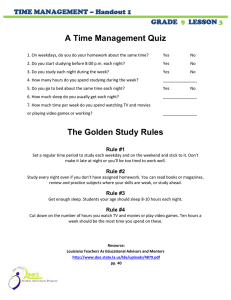
2/12/2013
I. Call to Order 7:00
II. Roll Call 7:00 to 7:04
III. Review and Passage of Minutes 7:05
a. No edits: yes 44 no 0 abstaining 2
b. Motion passes
IV. Announcements 7:07
a. Friday K­pop performance in Carroll room. Free admission and food
b. Friday Feb 16th Mardi Gras party 10pm to 1am in CC
c. SmithVersity program where students can participate in non­credit classes (to
teach or take). HPs were meant to send out survey. You could be paid to teach
classes. If you are interested or want the link to the survey, email
yooekim@smith.edu.
V. Emily Nagoski Presentation 7:10
a. Most people ask about sleep, sex, stress, nutrition (senate asked about sleep last
time)
b. Question: Talk about sex. There is a mechanism in brain and spine that controls
pleasure; one part is the brakes and one part is the gas pedal. Both are constantly
altering themselves and deciding whether or not you’re turned on. Three things:
desire, arousal, and orgasm.
i. Desire actually comes after arousal for many women, which is different
from the normal model. Between 5 and 20% of women do experience
arousal first. Most women experience “responsive desire.” 30% of women
say that they haven’t thought about sex in the last 30 days. 80% of men
experience desire before arousal. There are different ways to experience
desire. No current model to predict desire over lifetime.
ii. Arousal: Male bodies go “boing” when they are aroused. 85% correlation
between physical reaction and reported arousal. Women on the other
hand have only .2%. Women’s bodies will respond to more different
stimuli, because lubrication is a safety measure.
iii. Orgasm: women may show physiological of having an orgasm, and not
report having one. Non­concordance still applies. About ¼ are reliably
orgasmic from penetration, ½ sometimes, ¼ almost never. The shorter
the distance between clitoris and urethra, the more likely they will orgasm.
c. Question: sometimes women orgasm during sexual assault and feel horrible
about it. It is a reflex that happens, that may be impossible to control.
d. Question: male sexual assault. Male bodies do not have many situations in which
they don’t perceive things as sexually relevant stimuli.
e. Question: STIs between two female­bodied people. Highest risk of STI
transmission involves a penis. Almost all STIs are transmissible female­female.
Prevention strategy: get tested. Use barriers if you are unsure about your risk.
Dental dams are latex or non­latex squares, which you use as a barrier. Plastic
wrap also works (see through, transmits heat, you can use a huge square of it).
Prevent contact between genital fluid and skin. Use gloves and lube.
f. Question: anything about sleep. Good ways to fall asleep. College age people
need 9.25 hours of sleep a night on average. No such thing as too much sleep,
unless you are sleeping more than 9 hours a day and don’t feel rested. As long as
you get one chunk of 4 hours of sleep you can get the rest of the sleep any way
you choose. Micro sleeping: when you fall asleep and you don’t notice.
Drowsiness means you are almost asleep, it is the last step before you are.
g. Question: best amount of time for a nap. Sleep cycle is 1.5 hours. 45 minutes is a
bad idea because you are in the middle. Sleep hangover happens when you wake
up in the middle of the cycle.
h. Healthy amount of time to fall asleep 10 to 20 minutes. Most common cause of
not being able to sleep is that your brain won’t stop. Sleep is when your brain
stops responding to external stimuli. 5 shortcuts to sleep:
i. Write a list of all the things you are worried about forgetting, and then your
brain can relax.
ii. Media. Watch a show, read a book (not a new one), listen to music.
Download program called Flux (filters out blue light so you can sleep).
iii. Hot shower. Physiological cue for sleep is that your body temperature
drops, so artificially raising your body temperature tricks your body.
iv. Orgasm. Helps your brain relax, not for everyone (especially if you have a
roommate). ¼ college age woman hasn’t had an orgasm.
v. Substance of some kind: melatonin (occasionally). A glass of wine (can
mess up the second half of your sleep). Don’t use any substance more
than once a month.
i. Two kinds of dream: rehearsal or preparation. People who nap in the middle of
the day remember more.
j. Question: waking up every half hour. Stress responds the same to lions and
professors. Lions are acute; papers and school work are chronic stressors.
Quality of sleep is not as good when you are hyper vigilant about something.
Physical activity is really good to cope with stress (it tells your body you’ve
escaped from the lion).
k. Question: if you aren’t typically active, how do you get used to it? If fight or flight
doesn’t work, freeze happens. In order to get out of freeze, do low intensity things,
or visualize yourself doing your activity.
l. Question: when I go to the gym, I end up eating a lot. Calorie burning happens
mostly during sleep, exercise isn’t just to burn calories. If you’re worried about
body fat, think about whether or not it looks like the way it grew. Eat things that
look the way they grew.
m. Question: feelings about soy. Tofu doesn’t look the way it grew, but tofu doesn’t
seem to have hurt anyone yet.
n. Question: Nyquil to go to sleep? Any substance necessary more than once or
twice a month is an issue.
VI. E&A/Archives Presentation 8:01
a. Greta Stacy, chair of Elections and Appointments committee. This week and next
few weeks we will be having workshops about senate, to try and get excited about
and to make positive change in senate.
b. Archives committee (history of SGA):
i. Smith had first graduating class in 1875, no SGA until 1919. There was a
student counsel. This was mostly about social things like dancing. First
time quorum was not met was 1896 because only 6 members showed
up.
ii. Meeting minutes were taken in ledgers. These minutes are talking about
how Rally Day used to be Washington’s birthday and was a lot less fun.
iii. In 1899 students wanted a self­government: President Seelye did not
approve of separate government from the matrons.
iv. 1904: council voted that if you sign out a book for too long you could be
expelled.
v. SGA was originally just a social organizing platform.
vi. Smith was under quarantine in 1920, and people rebelled. These people
were expelled.
vii. In the 1920s to 1930s, there were only 11 members. Still mostly just rules
and social events for Smithies.1939, council had 14 members. Mostly
individual issues from the student body. Council had ledgers, and kept
track of all expenses.
viii. 1940s and 50s: most of the concerns were involved in the fact that
everyone was cutting class all the time. They felt students were being
overworked, and sent out a survey. Voted to extend Thanksgiving break.
Many of the conversations were about little things, like whether or not you
could wear bermuda shorts.
ix. 1960s: SGA came up with Smith Scholar program, which seemed like an
independent study. Helped people go abroad if they couldn’t afford it.
x. 1970s: there was no student run senate in the 70s. Started kosher meals
in 1973. In 1977 they started up senate again. In 1979 Smith tried to break
world record to make largest Sundae. Many discussions were about
dining.
xi. 1980s: many of the same orgs. Adas didn’t have enough representation,
so they had to amend the constitution to allow a representative in. Senate
tried to urge Smith to pull their investments from corporations that were
enforcing Apartheid in South Africa. Smithies occupied college hall to
make this happen.
xii. 1990s: mostly talked about the new buildings and architecture on campus.
xiii. 2000s to present: minutes are all on SGA website. When Hurricane
Katrina hit, Smith rallied to help out the victims. 2006 senate invited Mount
Holyoke senate to discuss role of women’s colleges in the world. 2007
Virginia Tech shooting rose alarms, and the Director of Public Safety
talked to senate about security. Many current security measures were
implemented in this time. In 2009, students had to vote to have soap in the
bathrooms. 2012, discussion about Anne Spurzem’s letter.
VII. Rally Day (posters) 8:29
a. Carnival, Wednesday night before rally day. All Smithies are invited to the events.
(free food)
b. Rally day’s events, the day after, are all open to everyone, as well.
c. Neilson Browsing Room 4 to 5 on Rally day, Archivist will talk about history of
Rally Day
d. Rally Day will honor excellent alums
e. The Commencement speaker will be announced the day of Rally Day
f. Canned Food Drive for Western Mass food drive at Carnival. If you donate, you
can enter into a raffle or a CC gift card.
VIII. Announcements:
a. T­shirt committee meeting after senate
b. Committee assignments will be announced at next weeks meeting
IX. Adjourn 8:34
**Kenzi will have committee assignments to you for next week’s meeting!






